Session finishespublished at 17:19 BST 26 September 2016
Economic and Monetary Affairs
 European Parliament
European Parliament
Brussels
And with that, this hearing with ECB chief Mario Draghi comes to an end.
Mario Draghi tells the Economic and Monetary Affairs Committee that the initial impact of the Brexit vote on the eurozone has been "contained".
He adds resilience after the vote was thanks in part to "adequate preparation" by both the ECB and the Bank of England.
The European Central Bank chief also discussed quantitative easing, low interest rates and the future of clearing services in the UK with MEPs.
The hearing was the third of four scrutiny sessions he is due to have with the committee this year.
Paul Seddon
Economic and Monetary Affairs
 European Parliament
European Parliament
Brussels
And with that, this hearing with ECB chief Mario Draghi comes to an end.
Economic and Monetary Affairs Committee
 European Parliament
European Parliament
Brussels
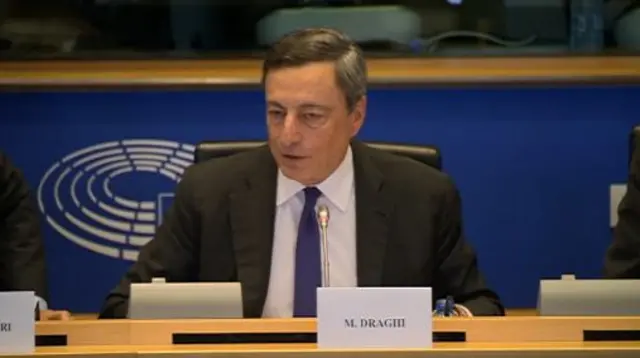
Labour MEP Neena Gill picks up on the issue of the UK's departure from the EU and its implications for the executing - or "clearing" - of euro-denominated transactions in the City of London.
She asks Mr Draghi whether he agrees that this clearing should take place in a city where there is a "critical mass" of clearing in other currencies - and that a move away from London would be "counterproductive" to the interests of remaining EU members.
The ECB has previously suggested that euro-denominated business would be better cleared on the continent - a move that was successfully challenged at the European Court of Justice by the UK government last year.
In reply, Mr Draghi says "doesn't have an answer" to the question at the moment.
He adds that he is aware a debate is ongoing about whether parallel legal structures for the transactions post-Brexit would damage stability, but that he has not yet "assessed" the arguments.
Economic and Monetary Affairs Committee
 European Parliament
European Parliament
Brussels
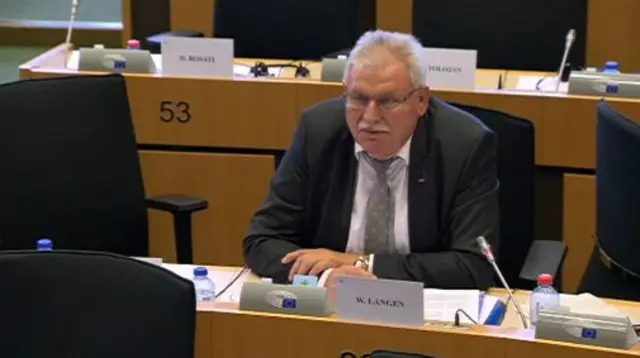
German Christian democrat Werner Langen asks how the ECB takes into account the effect of lower interest on borrowers when determining its macro-economic strategy.
He says there are a "lot of doubts" about whether low interest rates have helped the eurozone economy, and suggests that a lack of support for them may undermine the Bank's legitimacy.
In reply, Mr Draghi says the Bank derives its legitimacy from working towards its treaty mandate to hit its interest rate target, which is "always something that we have to keep in mind".
He says if interest rates were the same now as they were three or four years ago, the eurozone economy would have undergone a period of "protracted deflation".
Economic and Monetary Affairs Committee
 European Parliament
European Parliament
Brussels
Spanish Socialist Jonas Fernandez asks Mr Draghi how he thinks the EU Commission's flagship investment plan, external - launched in 2014 - could be improved.
The plan uses a certain amount from the EU budget and money raised by the European Investment Bank to try to stimulate private sector financing for infrastructure projects and loans for businesses.
Commission President Jean-Claude Juncker recently announced an expansion to the plan during his "state of the union" speech to MEPs two weeks ago.
Mr Draghi says the Bank welcomes the planned expansion, adding that the scheme is an "important addition to our toolbox" when it comes to stimulating the economy.
However he adds that the success of the plan also depends on whether government enacts policies to create a "growth-friendly growth environment".
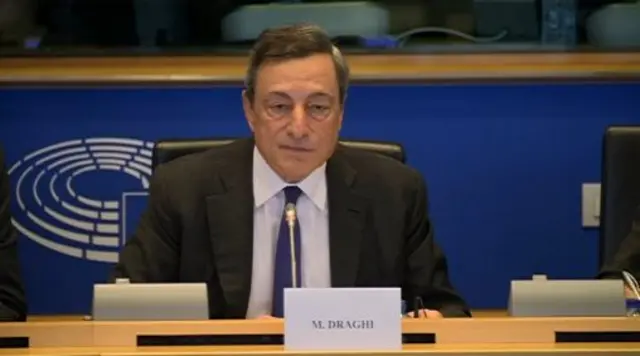
Economic and Monetary Affairs Committee
 European Parliament
European Parliament
Brussels
The “union” is the name for a series of measures passed following the 2008 financial crisis to try to improve the stability of the banking system in the eurozone.
It set common eurozone standards for the amount of reserve capital banks should have to hold, plus gave the ECB power to directly monitor the largest Eurozone banks.
The European Commission has also tabled plans to set up a eurozone-wide guarantee scheme to protect bank deposits, with the aim of reducing the risks of “spillovers” from bank failures.
However the plans remain blocked owing to strong opposition from northern states, including Germany.
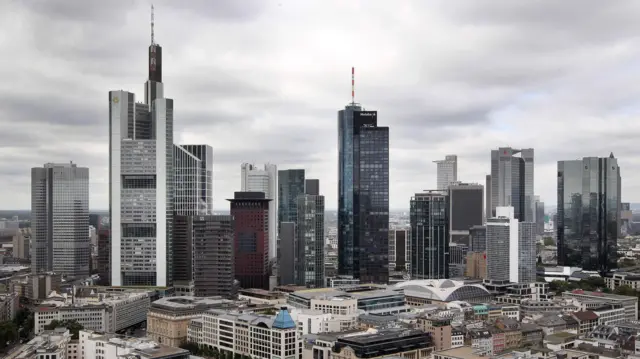 Image source, AFP/GETTY IMAGES
Image source, AFP/GETTY IMAGESEconomic and Monetary Affairs Committee
 European Parliament
European Parliament
Brussels
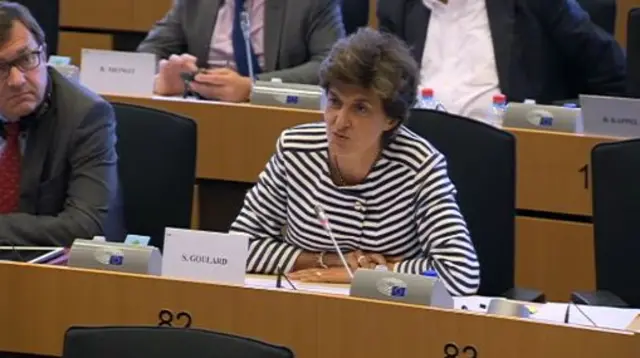
French Liberal MEP Sylvie Goulard asks whether, following a Brexit, it will be important that banks offering clearing services in euros are in a jurisdiction subject to the EU's Court of Justice.
French President Francois Hollande has been among those who have questioned, external whether the City of London should continue as a major clearing centre for euro-transacted deals following Brexit.
Mr Draghi replies that it is hard to imagine that any deal that is "perceived as discriminatory" could be a long-term source of stability for the euro area.
He says that the freedoms of the single market need to be enforced.
Economic and Monetary Affairs Committee
 European Parliament
European Parliament
Brussels
Quantitative easing is when a central bank buys assets, usually government bonds, with money it has "printed" - or, more accurately, created electronically.
The ECB started doing this in March last year, having previously launched programmes to buy covered bonds – backed by public sector loans or mortgages – in the autumn of 2014.
The current QE programme is due to continue until March next year, but could be extended until the Bank sees a “sustained adjustment” in eurozone inflation towards its 2% target.
The rate of inflation in the eurozone stood at minus 0.2% as of last month, external – the ECB says it expects this to increase to 1.2% next year and 1.6% in 2018.
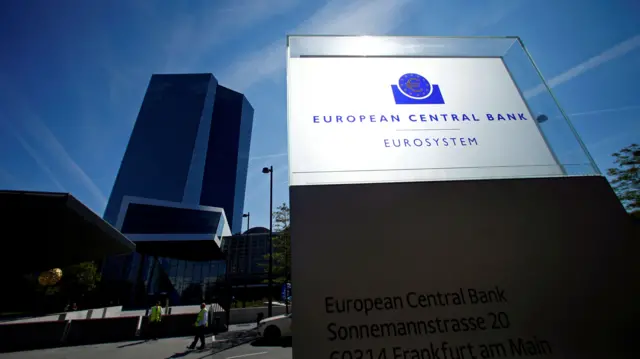 Image source, Reuters
Image source, ReutersThe QE programme is intended to boost lending
Economic and Monetary Affairs Committee
 European Parliament
European Parliament
Brussels
Belgian Conservative Sander Loones picks up on comments made by Mr Draghi in his opening speech, when he urged greater co-operation between member states over migration and defence.
He asks how these recommendations fit with the mandate of the Bank according to the treaties.
To some mirth from the committee members, he says that this is a "complex question" - but that he thinks the EU institutions have a responsibility to respond to the needs of citizens.
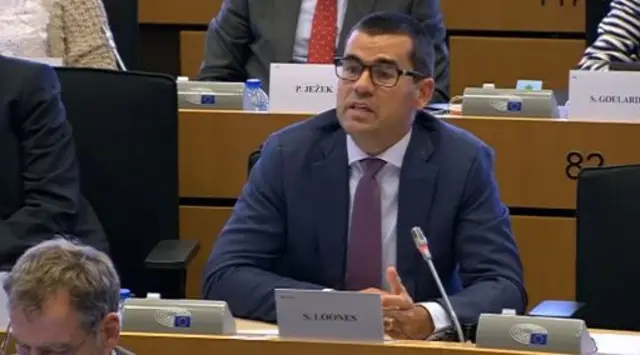
Economic and Monetary Affairs Committee
 European Parliament
European Parliament
Brussels
German Christian democrat Burkhard Balz asks Mr Draghi what the ECB intends to do if the UK's exit from the EU causes the economy in the eurozone to slow.
He also asks whether a continuance of the Bank's low interest rates - blamed by some for giving savers low returns - is "asking too much of citizens".
Mr Draghi replies that the eurozone has proved "quite resilient" in the immediate aftermath of the vote, thanks in part to "adequate preparation" by both the ECB and the Bank of England.
He says the outcome of the exit talks, and the length of time they take, will be crucial to determining the longer-term impact.
On interest rates, he says the current low rates are a "symptom of low growth", and that there is evidence they have helped the eurozone economy to recover.
He says the Bank is aware that the current rates punish savers, but that a reduction in lending costs - more example on mortgages - "more than offsets" the impact.
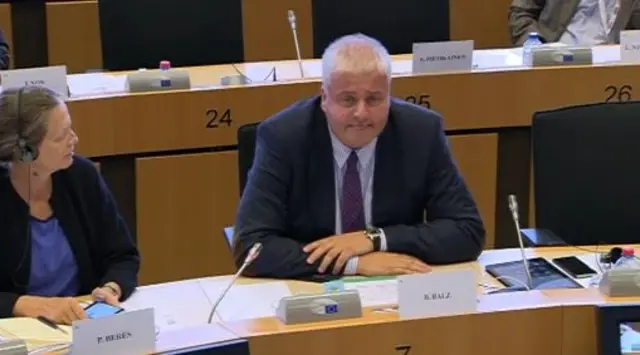
Economic and Monetary Affairs Committee
 European Parliament
European Parliament
Brussels
Prior to the vote to leave the EU in June, Mario Draghi had speculated that an exit could cut eurozone growth by between 0.2% and 0.5% over three years.
He has since said the forecasts should be treated with a "grain of caution" because it will depend on the outcome of negotiations between Britain and the EU on an exit deal.
At the Bank’s first rate meeting after the referendum in July, he said that the continent’s financial markets had "weathered" the uncertainty caused by the Brexit vote.
Mr Draghi said markets had displayed "courage and resilience" since the result.
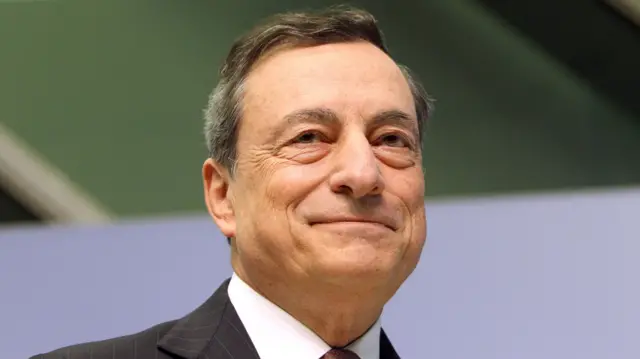 Image source, AFP/GETTY IMAGES
Image source, AFP/GETTY IMAGESEconomic and Monetary Affairs Committee
 European Parliament
European Parliament
Brussels
Mr Draghi continues, telling MEPs that differences between the financial markets in eurozone countries has declined "substantially".
He adds, however, that current low rates of inflation pose a challenge to growth prospects in the future, and insists that they are a "symptom" of the underlying economic situation in the eurozone.
He says that the eurozone has remained "resilient" in the wake of the Brexit vote, but that the long-term effect of a UK exit on the single currency bloc will depend on the "timing, development and outcome" of any deal between the UK and remaining EU states.
He says that the "integrity" of the EU's single market must be respected - notably that all participating members are "subject to the same rules".
Economic and Monetary Affairs Committee
 European Parliament
European Parliament
Brussels
Mario Draghi kicks the sitting off with a short speech, telling MEPs that the eurozone is continuing an economic recovery at a "moderate and steady pace".
However, he adds that this recovery has "slightly less momentum" than previously forecast in June.
He also tells MEPs that the "initial impact" of June's Brexit vote "has been contained" - although the UK's exit from the bloc still poses a "downside risk" to economic prospects in the eurozone.
He says the Bank's asset-buying programmes "will continue to provide support" to the Bank's efforts to raise inflation from the current low levels.
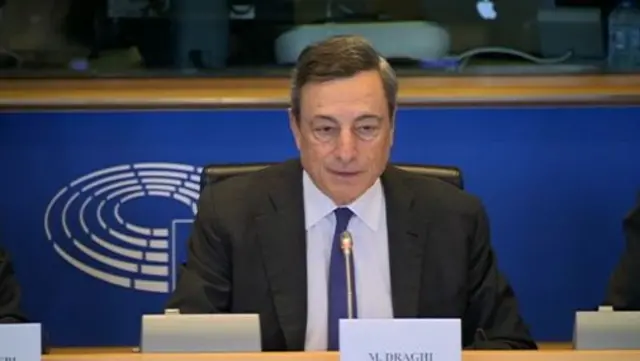
 European Parliament
European Parliament
Brussels
Hello and welcome to coverage of this sitting of the European Parliament’s Economic and Monetary Affairs Committee in Brussels.
MEPs will shortly be joined by European Central Bank (ECB) President Mario Draghi for the third of the four "monetary dialogue" sessions he is due to hold with the committee this year.
The meeting is expected to focus on the reasons behind the current low yields from European sovereign bonds, and differences in financial markets across the Eurozone.
This is also the first meeting Mr Drgahi has had with MEPs since the UK’s vote to leave the EU in June.
At his last appearance, held two days before the referendum, he said that the Bank was “ready for all contingencies” in the aftermath of the vote.